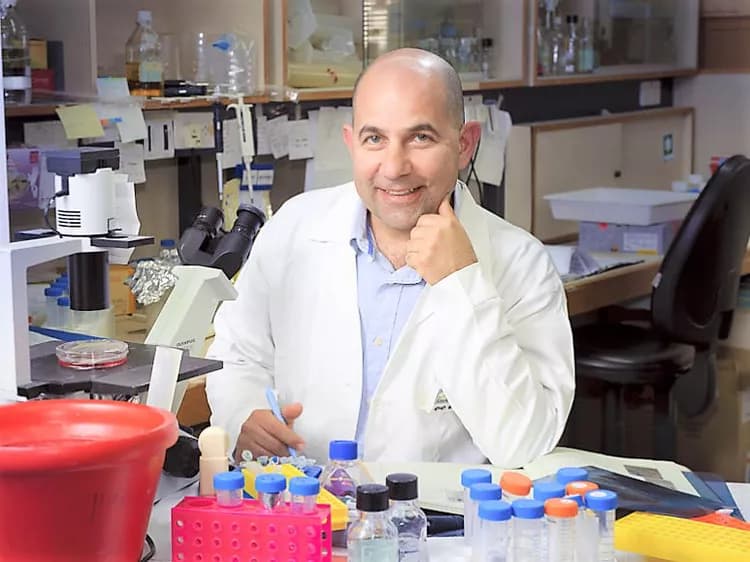
New Clues In Fight Against Leukemia, Other B Cell Cancers
When B lymphocytes (a type of white blood cell in the immune system geared for fighting diseases) turn cancerous, they become part of the problem, and need to be eliminated. But these "turn-coat" B cells have ways of avoiding death, and finding ways to kill them off has been an important focus in cancer research.
Now, researchers at the Technion-Israel Institute of Technology have identified elements and the processes in the biochemical pathway that allow B lymphocytes to be eliminated when they become cancerous and able evade the very system meant to destroy them. The groundbreaking work, which can be used in the fight against Leukemia and other B cell cancers, was published in the journal Cell Reports (16, 419-431).
B lymphocytes are part of the immune system that identifies and destroys viruses and bacterium. B cells have B cell receptors (BCRs) on their cell membranes, which normally allow the B cell to bind a specific "antigen," or biological "enemy," against which the cell will mount a response.
According to the researchers, normal B lymphocytes develop through two processes: positive selection (to promote continued, but controlled survival) and negative selection ("activation-induced cell death," or AICD to eliminate self-reactivity). These positive and negative processes are altered in cancer cells so the cells not only survive and grow but also resist their elimination.
"We have mapped out the pathway that rescues cancerous B cells from death," said study lead author doctoral student David Benhamou, who conducted the research under Prof. Doron Melamed of the Technion Faculty of Medicine. "With this new knowledge about the pathway, we may be better able to block the survival of cancerous B cells through the positive selection mechanism. We may also be able to more efficiently eliminate them by activating the negative selection mechanism."
The complex pathway drama by which cancerous B cells can survive by avoiding death or be killed off has several players. They include: microRNA molecules (miRNA); Pten -- a protein that is encoded by the PTEN gene, important in the development of many cancers when the gene mutates; a critical regulatory protein called CD19; and an enzyme called "PI3K" that is known to be capable of preventing the elimination of cancerous B cells in the process of "activation-induced cell death."
"Appropriate PI3K activity determines the positive and the negative selection of B cells," explained Prof. Melamed. "Activation of PI3K is balanced by another biochemical process in the pathway called Pten. While the extent of the "cross talk" between PI3K and Pten has been unclear, our work has demonstrated that a microRNA (miRNAs), which regulates gene expression, can sensitize the process for B cells turning cancerous and also enable them to evade cell death."
Conversely, "inappropriate" PI3K activity is often associated with impaired cell signaling that leads to alterations in formation and function of the immune system. In most cancerous B cells PI3K activity is increased, thus promoting continuous positive selection and survival of the tumor cells. In this work the researchers uncovered the biochemical pathway that contributes to this inappropriate PI3K activity. They found that Pten expression levels are affected by PI3K activity and that the cross-talk between Pten and PI3K is "mediated" by miRNA17-92.
This new knowledge about the process of regulation of the PI3K pathway -- and how signals along the pathway can control the fate of cancerous B cells -- could have future implications for treating cancer with the help of microRNAs, either by finding a mechanism to eliminate cancerous B cells, or through helping B cells to avoid becoming cancerous and remaining in the fight against infectious agents.
Materials provided by American Technion Society. Note: Content may be edited for style and length.
Disclaimer: DoveMed is not responsible for the adapted accuracy of news releases posted to DoveMed by contributing universities and institutions.
Primary Resource:
Coffre, M., Benhamou, D., Rieß, D., Blumenberg, L., Snetkova, V., Hines, M. J., ... & Getu, L. (2016). miRNAs Are Essential for the Regulation of the PI3K/AKT/FOXO Pathway and Receptor Editing during B Cell Maturation. Cell Reports, 17(9), 2271-2285. DOI: 10.1016/j.celrep.2016.11.006
Related Articles
Test Your Knowledge
Asked by users
Related Centers
Related Specialties
Related Physicians
Related Procedures
Related Resources
Join DoveHubs
and connect with fellow professionals

0 Comments
Please log in to post a comment.